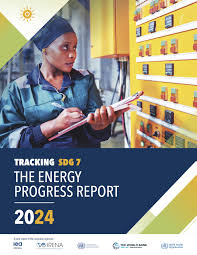SDG 7: Energy Progress Report 2024

SDG 7: Energy Progress Report 2024, released recently, finds that the world remains off course to achieve Sustainable Development Goal (SDG) 7 for energy by 2030.
Highlights of 2024 Report:
- The latest report confirms that the number of people without access to electricity increased for the first time in over a decade, as population grew—mostly in Sub-Saharan Africa—at a higher rate than that of new electricity connections, leaving 685 million people without electricity in 2022, 10 million more than in 2021.
- The world remains off track to achieve universal access to clean cooking by 2030.
- 1 billion people still live without access to clean cooking fuels and technologies, largely in Sub-Saharan Africa and Asia.
- Renewable electricity consumption grew more than 6% year-on-year in 2021, bringing the share of renewables in global electricity consumption to 28.2%.
- Installed renewable energy-generating capacity per capita reached a new record in 2022 at 424 watts per capita globally.
- However, considerable disparities exist. Developed countries (at 1,073 watts per capita) have 3.7 times more capacity installed than developing countries (at 293 watts per capita).
- It warns that current efforts are not enough to achieve SDG 7 on time.
- Between 2010 and 2021, India, along with China and Indonesia, achieved significant advancements in modern renewable energy use.
- Between 2010 and 2021, India recorded one of the highest increases in the use of modern renewable energy, with the share of renewables in total final energy consumption (TFEC) rising by nearly 7 percentage points.
- India’s transition to renewable energy has been bolstered by substantial international financial support.
- In 2022, the country received a notable USD 627 million for 47 renewable energy projects, many of which were valued at less than USD 1 million.
- A significant portion of this funding came from Germany and the International Bank for Reconstruction and Development (IBRD).
- India’s role in renewable energy extends to the transportation sector, where it, alongside the United States, Brazil, Europe, and China, accounts for 85 percent of renewable energy use.




